Peter MALONE
Saturday, 18 September 2021 19:30
Hot to Trot
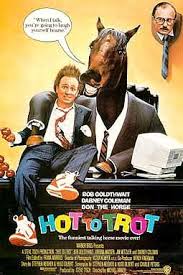
HOT TO TROT
US, 1988, 79 minutes, Colour.
Bobcat Goldthwaite, Dabney Coleman, voice of John Candy, Jim Metzler, Cindy Pickett, Virginia Madsen.
Directed by Michael Dinner.
Hot to Trot is a comedy about talking horses. It must appeal to someone! It is a throwback to the days of Francis the Talking Mule and Mister Ed (to whom there is reference). The star of the film's Bobcat Goldthwaite with his screechy voice (perhaps in the Three Stooges, Jerry Lewis tradition). Better at comedy is John Candy who supplies the voice of the horse. Dabney Coleman gets an opportunity to do some comic turns as the villain - with false protruding teeth. Virginia Madsen has some brief moments as the glamorous heroine.
There are the usual routines with talking horses and animals, a race In which Don, the hero, eventually wins. Other than that, there is not a great deal to commend the film. It was directed by Michael Dinner (Catholic Boys) and was co-written by Michael Neigher).
1. Comedy? Talking animals? Farce?
2. The special effects for the talking animals? The business firm? The city? The apartments? Racecourse? Musical score?
3. The title and the reference to Don? To Freddie?
4. Freddie and his relationship with his stepfather, his awkwardness, his voice? Big business and the firm, making shrewd investments? The advice of Don? The bad advice about the horse-feed? His clashes with his stepfather? Coping with Don, having him in the apartment? The comedy with the talking horse? His relationship with the secretary, getting married and having, a family? The build-up to the race and Don's winning?
5. Don as the talking horse, his history, his being friendly with Freddie's riding around in the vehicle, talking, with the other animals? parents, flirting? His range of jokes and puns? In the apartment, the party? The advice about finance? The build-up to the race, his telling the jokes, interfering with the horses and winning by his protruding teeth? The dentist fixing them?
6. Walter as villain, his girlfriend, Don watching them in the stable? His grief? The business deals, trying to swindle Freddie? The pressure on him? His girlfriend? The build-up to the race? His being defeated? His adviser and their swindling Don and making money out of him?
7. The secretary, attractive, sympathetic to Freddie, helping him out, marrying him?
8. The supporting cast - of humans and animals? The effect of the comedy when animals talk and act like human beings? A piece of American-style humour?
Published in Movie Reviews
Published in
Movie Reviews
Tagged under
Saturday, 18 September 2021 19:30
Hot Stuff
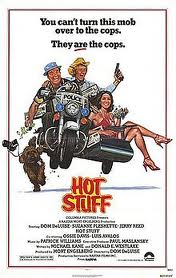
HOT STUFF
US, 1979, 87 minutes, Colour.
Dom De Luise, Jerry Reed, Suzanne Pleshette, Ossie Davis, Richard Davalos.
Directed by Dom De Luise.
Hot Stuff stars and was directed by the plump and daffy comedian Dom DeLuise?. He plays for guffaws rather than the subtle and this film is like that - a humorous variation on the police capers of the '70s. To boost arrests in Miami, a squad is set up as a depot for buying stolen goods as well as getting the goods on the almost 200 clients they get - as well as push from the Mafia. A gallery of eccentrics, funny sales of the hot stuff and a slam bang finale provide some laughs in quick undemanding entertainment. Co-authored by Donald Westlake who wrote the eccentric capers The Bank Shot and the excellent The Hot Rock.
1. Title, tone, humour? Police films of the '70s - serious and comic? From The French Connection to The Choir Boys - and their influence on this film? A humorous variation?
2. The appeal of farce? Parody? Knockabout humour? Verbal and visual humour? Irony? The point of the film - modern police work, criminals? Collaboration in the face of the Mafia?
3. The film as Dom de Luise's work - comic style., performance, direction of action? How successful?
4. The Florida settings and their location photography? Florida society and criminals?
5. The humour of the police precinct - lack of arrests, failure, transferrals? Bureaucracy and statistics? The Captain and his exasperation, relationship with the group? His backing of the project - time of regret.. the failure of the phones at the end. his happy ending?
6. The portrait of the group and the variety of types? Ernie and his success, humour, push? Doug and his support - and parody of romantic hero? Ramon and his Spanish background? Louise and her newness on the job. reaction, collaboration with the group? Their working together as a team?
7. The basic inventive idea - using the funds., arresting Hymie and running him out of town? Using his shop? The set-up - the humour of the cameras and the effect of photographing the criminals? The range of clients and humour? The deals with the police? Jokes?
8. The character sketches of the clients., their goods, the use of the money, the records? Reselling the goods to raise more money? The comedy of complications?
10. The background of the Mafia, the robberies, difficulties and crises?
11. The build-up to the party - and the criminals all out to enjoy themselves? The arrival of the police? Chaos and the attack of the Mafia? The long brawl sequence and its effect? Criminals backing the police against the Mafia? Their agreeableness in being arrested? The favourable statistics?
12. Humour on modern society and its morals, the law? The letter of the law and the spirit of the law?
Published in Movie Reviews
Published in
Movie Reviews
Tagged under
Saturday, 18 September 2021 19:30
House Under the Trees, The/ La Maison Sous Les Arbres. The Deadly Trap
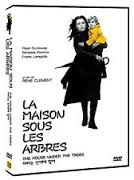
THE HOUSE UNDER THE TREES (LA MAISON SOUS LES ARBRES. THE DEADLY TRAP)
France, 1971, 100 minutes, Colour.
Faye Dunaway, Frank Langella, Barbara Parkins, Michelle Lourie.
Directed by Rene Clement.
Rene Clement has made several effective thrillers. This one is minor, relying on psychological atmosphere rather than quick excitement. It is helped by Faye Dunaway's fine playing of a difficult role, an adoring mother of two children who is obviously being forced into madness. There is something mysterious about her brilliant husband (Frank Langella); her neighbour (Barbara Parkins) is too charming and friendly. Eventually the children are kidnapped and the plot moves along swiftly to its obvious conclusion. The time spent on building up the mother's love for her children will delight many audiences, but might irritate those who came wanting something violent and quick to happen.
1. The significance of the title? The English title was "The Deadly Trap". Which is more appropriate? The success of the film as a thriller? Its use of thriller conventions?
2. How involving was the long build-up at the beginning? The visuals of the barge ride? Its association with character? Mood?
3. The introduction of the character of Jill? How real? As a mother, as a woman?
4. The indications of her madness? The details of her forgetfulness? Audience puzzle over her predicament? Wondering where it will lead?
5. Jill's relationship to her husband? The mystery of his personality? Audience interest in him? His relationship to Jill? To the children?
6. Was he better understood when it was realised that he was involved in industrial espionage? The details of such espionage?
7. The relationship of husband and wife? Trust versus pressure? How well explored?
8. Cynthia and her relationship with Jill and Phillip? Her betrayal? Her involvement in espionage? Her redeeming herself? The significance of her death?
9. The details and tension of the kidnapping? The effect on the children?
10. The portrayal of anguish of parents? The details of their search? The irony of Cynthia's death?
11. The horror at the end and the children shooting? The effect on them?
12. How adequate was the solution? Was the happy ending necessary?
13. How effective a thriller? How interesting the human themes?
Published in Movie Reviews
Published in
Movie Reviews
Tagged under
Saturday, 18 September 2021 19:30
Hustle
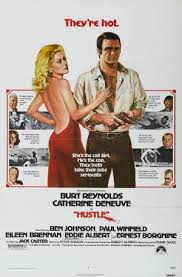
HUSTLE
US, 1975, 118 minutes, Colour.
Burt Reynolds, Catherine Deneuve, Eddie Albert, Ben Johnson, Paul Winfield, Eileen Brennan, Ernest Borgnine.
Directed by Robert Aldrich.
Many could think that the police/detective genre has more than run its course. Though advertised as police drama, this film uses its investigation as a metaphor for the hustling society of rich, violent, decadent, politically corrupt America. It is a grim and pessimistic picture. Director, Robert Aldrich, noted for his tough approach, continues it, although he successfully devotes a great deal of his film to establishing characters as persons rather than one dimensional types. Aldrich also concentrates on action and incident for his exploration which means there is plenty of (too much?) plot. Burt Reynolds is very good as are Ben Johnson and Eileen Brennan as ageing parents. Solid adult drama.
1. The use of the title,, its indication of themes, the quote that 'everybody hustles'? Audience expectation from the title?
2. The pessimism of the title and the film: about individual lives, the presentation of society, the end of the film as regards the principles? The significance and tone of Hustle? The ugliness of a hustling world? And no hope for the elimination of hustling world? And no hope for the elimination of hustling?
3. The 70s police framework for the film? Audience interest and response to these police thrillers? The example of such a genre, for example Phil at work, the interrogations, the siege of the killer in the factory his presence at the hold-up at the end? How well presented were these aspects of police drama?
4. The emphasis on portraying the society in America of the 70s? The husband and wife and the ordinary family (considered to be nobodies) and their daughter who was killed? The drug scene, affluence, corrupt individuals, the world of Leo Sayer? Audience response to the presentation of this decadent world?
5. The presentation of a 1970's love story: the relationship between Phil and Nicole and its quality? How did the various ingredients blend for the overall impact? To give a humane quality to the police aspects and the picture of society?
6. The importance of the opening with the bus, the children, the discovery of the corpse,, the transition to Phil and Nicole? The opening up of the various themes from the start, guiding the audience in its response?
7. The quality of the love story: Phil, Burt Reynolds' style, the memory of the wife,, visiting her and his son, disillusionment with love and marriage, his confusion about right and wrong in his personal life, the arrangement with Nicole. his inability to live it and his growing jealousy? Nicole and the presentation of her world, as a professional call-girl, her feelings and lack of feelings. seeing her at work with Leo Sayer, and the sequences on the phone? The significance of Phil and Nicole making love, watching television, drinks and sharing music, outings going to the film.? Their fight and- yet their love? The hopes for the trip to Rome. the conversations about Rome as an ideal and a dream? The musical accompaniments for each, the modern music, Charles Aznavour for Nicole? This build-up to the sad and futile ending? Audience feeling for this love story?
8. Phil as a policeman and his qualities in his work? His humanity and toughness, the lack of violence and yet his use of it? The nature of interrogations, viewing corpses, use of guns? His humane treatment of victims? His clear sense of right and wrong in terms of the law, contrasting with his own personal life? The comparison with Lewis and his violence, the atmosphere of a negro policeman? His brutality. his changing attitudes? The visits to Santori and his laying down of the rules? The implied questions of what makes a good policeman in this kind of society?
9. Marty and his reaction to his daughter's death? The explanations of his life in Korea, in an asylum, relationship with his wife, spoiling his daughter and yet her leaving home? His clash with his wife? With the police, especially on viewing his daughter's corpse? The emphasis that he was nobody? His own class self-consciousness? Inbred antagonism towards the police? His attitude towards the law, going to the dive and getting bashed, seeing the porno film of his daughter? The pressures on him to shoot Leo Sayer? What right did he have? Why did he do this? Could Phil have avoided all this?
10. Marty and his relationship with his wife? Her outing with Phil and explaining the background of their life together, Gloria's attitudes towards her mother, her leaving home? Audience compassion for Marty and his wife?
11. The irony of seeing Gloria as a corpse, the significance of her life, leaving home, sexuality, money and greed, the glamorous world, her degradation in the parties and the films, drugs and the inevitability of her death?
12. The world of Leo Sayer? His position in society, his wealth, taste, work for the law, his listening in to arranged assassinations, murder. his parties? The inevitability of his death? Was Marty right in killing him? Was Phil right in arranging Marty's defence and his day in court?
13. How important was the detail of atmosphere and locations for the credibility of the film?
14. Its explorations of values, right and wrong. justice love and hate. corruption in the modern world?
Published in Movie Reviews
Published in
Movie Reviews
Tagged under
Saturday, 18 September 2021 19:30
How to Murder Your Wife
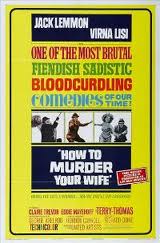
HOW TO MURDER YOUR WIFE
US, 1964, 118 minutes, Colour.
Jack Lemmon, Virna Lisi, Terry-Thomas?, Eddie Mayehoff, Sidney Blackmer, Claire Trevor.
Directed by Richard Quine.
How To Murder Your Wife is an amusing sex comedy farce of the '60s, typical of many films that Jack Lemmon made during this period e.g. Under The Yum Yum Tree, Good Neighbour Sam. He is very adept at this kind of comedy. The film introduced Virna Lisi to American audiences. However, the supporting cast of Terry-Thomas? as an English butler and Eddie Mayehoff and Claire Trevor are excellent. The screenplay was written by George Axelrod, author of such comedies as The Seven Year Itch, Lord Love a Duck, and The Secret Life of an American Wife. The film has an added bonus in its background of Lemmon being a cartoon writer and having dry runs to illustrate how well the cartoon would work. This provides a great deal of comedy as does Terry-Thomas?. The film is a little dated in its comedy of manners 60's style but is nevertheless quite enjoyable.
1. The significance and tone of the title, its irony? The relationship of the film and its title to comic strips? The personal touch and Charles' initial confidentiality? How were audiences enticed into participating in the film and its plot?
2. The importance of colour, Panavision, New York settings, the apartment, the settings for comic strips and their enactment? An environment for a comic strip writer? An environment for this kind of film? A very city film?
3. Was there a comic strip style in the film itself, the actual acting out for the comic strips? Audience response to this and its consequent artificiality?
4. The importance of Charles especially during the credits? His very personal and confidential tone? A framework for the issues of the film, especially men-women relationships and marriage? Terry-Thomas' contribution, his British clipped tone, American awe for the English butler? The character of Charles, his contribution to Stanley Ford's way of life, his participation in photographing the comic strips, his comedy style, the irony of his regretting Stanley's marriage? How credible was his own flirtation at the end?
5. Stanley as a man about town, the way this was visualised at the beginning, his not wanting a wife, the adolescent who acted out his adventures in comic strips? The creative American producing comic strips? The great following that he had e.g. the men on the building site outside? Jack Lemmon as the typical American hero?
6. How telling was the humour about marriage? The ironic dialogue and comments, the men's party before the marriage ceremony, the comments of the judge?
7. The irony of Stanley's actually getting married? The effect on his way of life? His wife redesigning his home, her emphasis on food, his need for exercise, sexuality? The effect on Stanley, the effect on Charles? The humour of their fighting? Stanley's trying to conceal his wife, and then succumbing?
8. How attractive was the wife? The irony of her coming out in the cake, the marriage? Her inability to speak English, her voluble Italian? Her background, the competition for cooking, her clothes? The transformation with new clothes, her redesigning the how, her emphasis on food and overfeeding Stanley, her continued interest in sex? Loving Stanley? Thriving on marriage? The humour of watching television to learn English? How credible a character? How much comic strip character?
9. The importance of Stanley making his hero a married man, drawing his own adventures? The satire on marriage? The plot for murder? The importance of the trial run and the way that it was photographed?
1O.The human touch with the wife being hurt and disappearing? The irony of Stanley on trial? The twisting of evidence to condemn him, especially that of his friend, especially Harold's?
11.The contribution of Harold and Edna? The irony of the middle-aged married couple? The character of each, Harold's work and support? Edna's support of Stanley's wife? The importance of their appearing in the court sequences? Harold's wishful thinking and Edna's reaction?
12. Comment on the irony of Stanley's winning the case for the wrong reason? The presentation of male chauvinism? The members of the jury, the judge etc.?
13. How credible was the wife's return? Stanley's missing her and the reconciliation? The wife's mother arriving and her bid for Charles? Was this reconciliation too sentimental for what went before? Or was it a particularly American touch?
14. The exploration of themes of men and women and their relationships, marriage, traditions and modern morality, love and selfishness? How effective when explored in comedy?
Published in Movie Reviews
Published in
Movie Reviews
Tagged under
Saturday, 18 September 2021 19:30
How the West Was Won
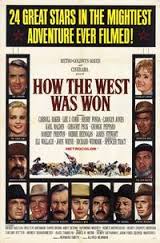
HOW THE WEST WAS WON
US, 1962, 157 minutes, Colour.
Gregory Peck, George Peppard, Debbie Reynolds, Carroll Baker, James Stewart, Karl Malden, Richard Widmark, Robert Preston, Henry Fonda, Lee J. Cobb, Eli Wallach, John Wayne, Brigid Bazlen, Walter Brennan, David Brian, Agnes Moorehead, Russ Tamblyn, Thelma Ritter, Henry Morgan, Lee Van Cleef. Narrated by Spencer Tracy.
Directors: The Civil War, John Ford; The Railroad, George Marshall. The majority of the film was directed by Henry Hathaway.
How the West Was Won was a big film of its day. Filmed in Cinerama, it showed the scope of the American Western and its tribute to the American pioneering spirit. Many stars appear in the variety of episodes. Technically the film is spectacular, although the Cinerama origins are evident in lines seen on the screen where the images are joined. The music is also rousing. The film was directed by veteran Henry Hathaway. The Civil War section, directed by John Ford, is worth noting.
1. How successful as a Western epic was the film? Its overall impact? An American response to this history and heritage of the west? For a non-American audience?
2 The use of Cinerama and wide screen techniques, location photography, the episodic structure of the film, the use of colour, musical themes, time-span, the narrative and its patriotic tone, the modern and patriotic ending, the list of stars?
3. What picture of America was presented in the film? What presuppositions about Americans and American history? Aspects like pioneering,: courage, the families, settling down, the dangers, confidence tricksters, war, the building up of towns, money, law and order, railways, outlaws, the growth of civilization? What is particularly characteristic of the American west? How optimistic was the film? The implications of the title and the glory and achievement of the west?
4. Rivers: the picture of the Prescott family, the individuals, the group and the hopes, going down the Eyrie canal, daughters out in the west, the sequence of the rapids, the parents' deaths, the pirates and Linus's rescuing them? Was this a fair picture of pioneering days? How strong was the development of characters? The presentation of the feeling behind pioneering? The use of songs? The emphasis on Linus as a hero and mountain man, his coming to help, his decision to settle, his relationship with Lilith? With Eve? The man and woman pioneering in the wilderness?
5. Plains: the emphasis on Lilith and the change on the previous story, the picture of St. Louis life, Lilith's admirers, the ethos of gambling, Cleve as the suave hero-villain? The story of the inheritance, the picturing of the Wagon-train and the Indians; Morgan as a character and his rivalry with Cleve for Lilith? The picture of the steamboats, the picture of San Francisco? The development of characters in this section? The complicated opening up of the west? The picture of the Indians in the west?
6. Civil War: was it evident that this section was made by a different director? The picture of Zeb and his farewell? The brother who did not go to war? Eve and her heritage and the next generation? The picture of the Civil War and the explanation? Grant and Sherman? The temptation to desert? The Southern deserter and his deception? Zeb's heroism? The nature and impact of war? The horror? Its impact in America's history? Zeb's return and his decision to stay in the army? The quality of character in this segment?
7. Railroads: yet another director, was this evident? The picture of Zeb as an American hero? The mountain man? His work in the frontier? The question of the railways? Mike King and his pressurising? The question of land grabbing? Stampedes? What insight into the problems of the west?
8. Outlaws: the continuing saga of Zeb? The family and the growing generation? Lou and law and order? Gant as the typical criminal of the west? The picture of Lilith in old age and the picture of continuity of the story through the generations? The adventure on the train? The lawman saving the west? The picture of civilization and the building up of modern American cities? How interesting, how convincing?
9. The film had a happy ending? Was this appropriate for American history? The patriotism and optimism of the postscript?
10. How successful was this film as entertainment? As a picture of American values?
Published in Movie Reviews
Published in
Movie Reviews
Tagged under
Saturday, 18 September 2021 19:30
Hush....Hush, Sweet Charlotte
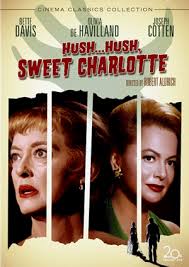
HUSH... HUSH, SWEET CHARLOTTE
US, 1964, 134 minutes, Black and white.
Bette Davis, Olivia de Havilland, Joseph Cotten, Agnes Moorehead, Cecil Kellaway, Mary Astor.
Directed by Robert Aldrich.
Hush... Hush, Sweet Charlotte was made by the same team that made What Ever Happened to Baby Jane. It was meant to capitalise on the box office success of the former film. It succeeded. Originally Bette Davis and Joan Crawford were to
appear again. However, Joan Crawford became ill and Olivia de Havilland, despite her not wanting to appear as a villainess, took over the role. Her sweetness is all the more sinister as it turns towards horror and guilt. In this film she is in league with Joseph Cotten against Bette Davis. Mary Astor and Agnes Moorehead are following in the example of the leading actresses in also turning in horror roles.
The success of Hush, Hush Sweet Charlotte and the other films of the time that Bette Davis was making, e.g. Dead Ringer, The Nanny, meant that many actresses became interested in being in horror films. Olivia de Havilland herself then went on to make Lady in a Cage. Hush, Hush Sweet Charlotte is an enjoyable Gothic horror in itself, and an example of how Hollywood can capitalise on a trend.
1. How enjoyable a film was this? How similar to whatever Happened to Baby Jane? How did it use Bette Davis? Did it exploit her and her capacity for horror films?
2. How black was this film and how sombre? Its portrayal of madness? Its portrayal of gore? Whom was it meant to appeal to? Is it a favourable thing to have this kind of appeal, to madness and blood? What values for entertainment are there in this kind of film?
3. How obvious was it that this film had a big budget? How did it use it for locations, atmosphere? As a baroque horror film? Luxuriant in its settings and in its horrors?
4. Comment on the effectiveness of the prologue. The transition from 1927 to 1964? The build-up for theme, plot, awareness of Charlotte? Charlotte during the credits and the pathetic appearance she made? The tone of the music and song? The film's focus on Bette Davis? Did she gain audience sympathy immediately?
5. Did the film give insight into the character of Charlotte? Audience response to her in the prologue, her affair, her father's treatment of John, her father's treatment of her, the dance and the blood on the dress? The transition to her strident tones and the land developers? Her firing the gun? The relationship with Velma? Her living with her memories and wealth? Living with memories and guilt? Her fear of Jewel Mayhew , her relying on cousin Miriam, on Dr. Drew, how mad was she, how much in torment, the details of her worry? Her response to Miriam and the change, her becoming a victim, her suffering at the hands of Miriam? The scene with her memories of John and her father, the shooting of Drew, disposing of his body, being victimised by Miriam? The impact of the truth, the ending and the reading of the letter? Why was Charlotte's character so rich in this film - detail, incidents, Bette Davis' characterisation? Did Charlotte seem a real character? In the American south and the decaying south?
6. How important was decay and change for the film? The house and its being pulled down, from past to modern eras? The class question of the rich and the poor? The background of money and Sam Hollis's gaining of money? Decay and evil and guilt?
7. How important was the theme of guilt? Who were the people who experienced guilt? Who had consciences and who did not? How was conscience and guilt linked with suffering?
8. How attractive was cousin Miriam at first? Olivia de Havilland's personality? Her kindness to Charlotte? The irony of her relationship with Velma and Velmia's seeing the truth? Miriam as kind on the surface? How shocked were audiences to discover the truth? When she became worse and domineering? Her hardness? How insane was she? The irony of her death? The truth of the past as regards Jewel Mayhew, Drew, Charlotte?
9. How villainous was Drew? Surface respectability changing into guilt? The nature of his complicity? His greed? Was Miriam right about his abilities to be senior partner?
10. The importance of Velma for the film? Agnes vigorous performance, her appearance, her love for Charlotte, her gruffness, her going to Harry Willis? The important sequence of her helping Charlotte and her death? What tone did she add to the film?
11. How did Jewel Mayhew contrast with them all? Her dignified appearances, her impending death, her response to Miriam? The irony of the truth about the murder and blackmail? The letter?
12. How did the characters eventually give more perspective to the incidents of 1927: the father and people thinking of his guilt, the significance of his encounter with John, the characters and the effect of the death on them? Charlotte's father in reality? Contrasting with Charlottes memories of John, the happiness, the song, the dancing, eventual shooting? Charlotte's memories of the hold of her father?
13. How important was Harry Willis to the film? Providing narrative background? Sympathy for Jewel and for Charlotte? A prod to Miriam? His role at the end for the truth? His memories of Charlotte in the past?
14. The importance of minor characters like the photographer and his lurid story and photographing of Charlotte? The sheriff and Charlotte's memories of him and his trying to evict her? The foreman and his clash with Charlotte?
15. Which were the highlights of the film: the children trespassing in the house, Charlotte shooting at the workmen, the noises and the storm in the night, the death of Drew, Charlotte on the stairs seeing him alive, the way that the house and its interiors were filmed?
16. Was the resolution satisfactory - Charlotte overhearing and killing the two (the preparation for this?)
17. How satisfying were the final sequences - the women gossiping, Harry Willis and the letter, Charlotte leaving the house, the music box, John and her father, and the impact of the letter?
18. Was the film successful heavy-handed horror yet evincing pathos for the characters and a human response from the audience?
Published in Movie Reviews
Published in
Movie Reviews
Tagged under
Saturday, 18 September 2021 19:30
Husbands
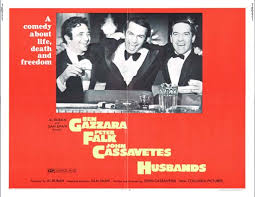
HUSBANDS
US, 1971, 129 minutes, Colour.
John Cassavetes, Peter Falk, Ben Gazzara.
Directed by John Cassavetes.
Husbands is not everybody's film. It is really an underground film, financed by a major company and released commercially. John Cassavetes, a popular actor (from A Man is Ten Feet Tall to Rosemary's Baby) has made several well received features, especially Shadows and Faces. Here he has written, acted in and directed, in collaboration with friends Falk and Gazzara, a slice of life, a chapter in the middle of three men's lives.
The technique of the film is prepared improvising. Some of it goes on too long. Some scenes are very moving. The frog-like woman in the London club is a masterpiece of horror; the laughing woman in the dentist's chair is contagiously hilarious. The film does not verbally specify its point or purpose, and audiences who rely on such help will find the film long, too episodic and generally directionless. However, viewed as three men being themselves for a while, the film shows us human beings and life. It is a catalogue of incidents, certainly at no real depth. But it asks us to react to them. It wants some depth response in us; so the film is really our individual reactions to the personalities, behaviour of these adolescent, man-in-the-street, husbands.
1. An interesting film? Why?
2. Rambling, too improvised?
3. The film was obviously a slice of life, without a contrived beg-inning or end. Did this satisfy you, or would you have preferred a better-planned film?
4. What did you learn about these husbands, about husband-wife relationships from a man's point of view?
5. Since this was an episodic, slice-of-life film, a good way to discuss its issues and their impact would be to take each episode, consider its point, ask why it was included in the film, ask what it revealed about Gus, Archie, and Harry.
- the opening good-friends' stills and the noise;
- the funeral (smoking, manners, grief);
- the taxi ride and Archie’s growling;
- the decision to go on a bender;
- the sports' sequences;
- acting like kids on the street, the rumpus;
- the drunks and the song competition;
- the toilet discussions, being sick, aloneness;
- Harry's clash with his wife and her mother, his changing his clothes and their not liking it;
- their jobs, especially the dentist scene, Harry at work;
- ringing their wives and going to London;
- locking themselves into London clubs and drinks, the symbol of the rain;
- choosing their rooms at the hotel;
- their gambling, Archie and the English, the old painted woman;
- Mary and Gus and 'whisky';
- dinner in their rooms;
- the three encounters with the girls;
- why did Gus and Archie fail? (Because they were husbands?)
- why did Harry succeed and change? the party in his room?
- the return home.
6. Why was Harry different from Gus and Archie (touchier, more 'class', we see his wife and mother-in-law, more of a lover, greater yearning to be free)?
7. What kind of husbands were Gus and Archie?
8. What picture of the rest of mankind did the film give - the people at the bender with their songs.. the girls in London, the frog-like woman at the club?
9. Do you think more films should be made like this, just insights into people?
10. Many consider the film quite good, but ultimately shallow, even callow, not getting us very far in insights. Do you agree?
Published in Movie Reviews
Published in
Movie Reviews
Tagged under
Saturday, 18 September 2021 19:30
Hurry Sundown
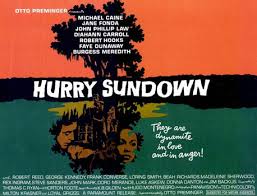
HURRY SUNDOWN
US, 1967, 141 minutes, Colour.
Michael Caine, Jane Fonda, John Philip Law. Faye Dunaway, Diahan Carrol, Robert Hook, Burgess Meredith. Beah Richards. Jim Backus.
Directed by Otto Preminger.
Hurry Sundown was one of those films that everybody enjoyed themselves attacking and condemning for its bad taste, length, acting, direction by proverbially bad director Otto Preminger, for double meaning sex references and phallic symbols and patronising attitudes towards African Americans. There is probably some truth in all of this, but for most audiences it would probably prove to be interesting and raise issues, which are quite important, in the context of an interesting story.
1. What was the main theme of this film? Why?
2. The blacks sang the song which included the words "Hurry Sundown". What did they mean in the song? How does this throw light on the meaning of the film?
3. The film's structure, especially in the opening stages, is a paralleling of the two couples - Henry and Julie and Rad and Lou. How was this done cinematically? How effective was it? Note the styles of their Christian names, their love, their children and their impact in their own lives, money, ambitions, attitude to blacks.
4. A reviewer attacked this film as typical of the 'open season' on the South and said it was a harsh caricature of the South, bullying its victim. How true was this? What aspects of the film support this? What aspects would negate this?
5. What picture of the South did the film give you?
6. Did the film take sides for whites and blacks? what sequences or pieces of dialogue indicate this?
7. What kind of a man was Henry Warren? What were his origins? Why was he so ambitious? How ruthless was he? How much feeling had he? How much love? What did the Riverside project mean to him? Why? Why had he not gone to the war? Why did Charles think so much of him? What was his attitude towards his wife? Child? What did the saxophone mean to him?
8. What kind of a woman was Julie? A Southern belle? How spoilt? How arrogant? How loving - to Henry, her son, Aunt Rose? How proud and vindictive was she? Why did she turn against Reeve? Why did Henry mean so much to her? How happy was her life in comparison with the McDowells?
9. Is it fair to characterise the McDowells? as 'the goodies' and the Warrens as 'the baddies'? How attractive were Rad and Lou as a couple? What picture of family life did they show? How important was money to them?
10. How did Rad relate to Reeve? Why?
11. Did you like Reeve? Why did he have a chip on his shoulder? Was Rose a good woman? Was she a 'white man's nigger'? Should she have fought for her land? What principles were at stake?
12. Did cousin Clem do the right thing as a clergyman towards whites and blacks?
13. Were the Purcells caricatured: what kind of a man was the Judge? How 'political' was he? How did he handle the trial? How prejudiced was he? Why was his wife a snob and his daughter a slut?
14. Were the men in the store and their humiliation of Reeve and their threatening of Rad typical Southerners? Why? What of the sheriff?
15. How irresponsible and malicious was Henry - in his rigging of the trial, in his action against Rad, in the injury of his son, in his lies and manipulation of Julie, in his plan for the explosives?
16. Did Rad do the right thing with the deed? Why? Was Lou right in being afraid for him? Why did Charles betray his father?
17. Vivian, how shrewd was she? What impact did she make on Julie?
18. The ending of the film - Henry's jeers, Julie's quest for her son, Charles' death and the losses for the McDowells?, the plan to build up again? Was this meant to be a lesson for an American audience? How?
19. Was this popular fiction or a serious problem about the South? a good film? effective? Why?
Published in Movie Reviews
Published in
Movie Reviews
Tagged under
Saturday, 18 September 2021 19:30
Hunting Party, The
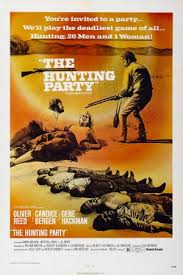
THE HUNTING PARTY
US, 1971, 110 minutes, Colour.
Oliver Reed, Candice Bergen, Gene Hackman, Simon Oakland.
Directed by Don Medford.
Forget your love of the old West and its tough heroics. Remember the greed, hatred and brutality of harsh frontier men. Admit that a bullet rips and gashes flesh, spatters human blood and gore; real agony and death cannot be glossed over, intensify this into two hours running time and make it as visually jolting and sickening as you can. You might then imagine something like this film. The message about disgusting human violence is obvious. You might have enjoyed this story of vengeance and chase with John Wayne, but this is the ugly West that myths cover with glory. Serious viewing only.
1. Is this the kind of Western you like to see? Why?
2. How did the opening sequences, the cutting up of the horse, and the intercourse, set the tone for the rest of the film?
3. The contrast between the hunting party and the outlaw party: one respectable, one not. The question of morality: who is good and who is bad? Appearances and reality.
4. The contrast between Brand Kruger and Frank Calder as men? The role of Melissa and her relationship to both?
5. Melissa as a person - her role in the school, kindness etc?
6. The hunting party itself (symbol of the U.S.?) its luxury, extravagance, sensuality, lack of any moral perspective, where killing is sport and whim is pleasure? The train, the rifles etc.?
7. The role of the rifle - violence, arrogance, prestige, the motivation behind having and wanting such a gun?
8. The outlaw party - what made them outlaws? Kruger-type society? Calder taking Melissa violently but that he could read? Frank as a leader, his relationship to the group? Dominant?
9. The brutal treatment of Melissa - how necessary in this film? How visually necessary? For realism? The brutality and sexual overtones? the involvement of audience feeling in the victim of brutality.
10. Calder's changing attitude to Melissa. his growing protection, turning into love? How plausible? Her reaction - hunger strike (and the sensuality of the details of eating), attempts to escape, the ugliness of the first sexual encounter, her changing attitude?
11. Why did the hunting party go after the outlaws, - any concern for Melissa as a person, just a continuation of the sadism? The growing obsession of Kruger which even wearied his companions? The violence and ugliness of the shootings, the stalking, the use of the rifles?
12. The outlaws becoming prey? The visual violence of their deaths? (How necessary? How ugly? How sickening for the audience? How realistic?) Fear and menace?
13. How did the journey change all the participants for better and worse, especially Melissa's involvement?
14. The town - a reflection of the world of the film - ugly, drunken, brutal? Attempts to save life, attempted rape, self-defence killing?
15. The hunting party in the town - merciless?
16. The escape into the green area, dreams, plans, some hope - how ironic? The landscape echoing the mood, their not being shot?
17. The desert - its significance, its harshness, escape, their longings? How had they changed? How had Kruger hardened? The meaninglessness of the deaths?
18. Was this film necessary? Was it exploitive, tasteless, sensationalised?
19. What contribution to the Western genre did this film make - conventions, fate etc.?
20. Why was this film made? For whom?
Published in Movie Reviews
Published in
Movie Reviews
Tagged under